外研版七上知识点整理
- 格式:doc
- 大小:90.50 KB
- 文档页数:11

七年级上英语外研知识点归纳总结一、单词和短语1. Greetings and Introductions (问候和介绍)- Hello! (你好!)- Hi! (嗨!)- Good morning/afternoon/evening! (早上/下午/晚上好!)- How are you? (你好吗?)- Nice to meet you! (很高兴见到你!)- What's your name? (你叫什么名字?)- My name is... (我叫…)2. Classroom Objects (教室用品)- Pen (钢笔)- Pencil (铅笔)- Book (书)- Desk (课桌)- Chair (椅子)- Eraser (橡皮擦)- Ruler (尺子)- Bag (书包)3. Numbers (数字)- Zero (零)- One (一)- Two (二)- Three (三)- Four (四)- Five (五)- Six (六)- Seven (七)- Eight (八)- Nine (九)- Ten (十)4. Days of the Week (星期) - Monday (星期一)- Tuesday (星期二)- Wednesday (星期三)- Thursday (星期四)- Friday (星期五)- Saturday (星期六)- Sunday (星期日)5. Family Members (家庭成员) - Mother (妈妈)- Father (爸爸)- Brother (哥哥/弟弟)- Sister (姐姐/妹妹)6. Colors (颜色)- Red (红色)- Blue (蓝色)- Yellow (黄色)- Green (绿色)- Orange (橙色)- Purple (紫色)- Black (黑色)- White (白色)二、语法知识点1. 一般现在时- 表示经常性或习惯性的动作或状态。
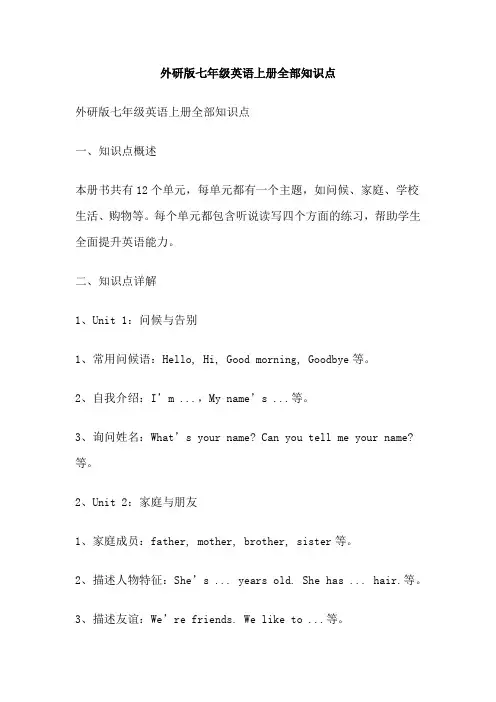
外研版七年级英语上册全部知识点外研版七年级英语上册全部知识点一、知识点概述本册书共有12个单元,每单元都有一个主题,如问候、家庭、学校生活、购物等。
每个单元都包含听说读写四个方面的练习,帮助学生全面提升英语能力。
二、知识点详解1、Unit 1:问候与告别1、常用问候语:Hello, Hi, Good morning, Goodbye等。
2、自我介绍:I’m ...,My name’s ...等。
3、询问姓名:What’s your name? Can you tell me your name?等。
2、Unit 2:家庭与朋友1、家庭成员:father, mother, brother, sister等。
2、描述人物特征:She’s ... years old. She has ... hair.等。
3、描述友谊:We’re friends. We like to ...等。
3、Unit 3:学校与课程1、校园设施:library, playground, classroom等。
2、课程名称:English, Maths, Science等。
3、时间表述:It’s ... o’clock. We have ... at ... o’clock.等。
4、Unit 4:食物与饮食1、食物分类:fruit, vegetables, meat, dairy等。
2、饮食习惯:I like to eat ... I don’t like ...等。
3、餐厅用语:Can I have ...? What would you like to eat/drink?等。
5、Unit 5:购物与交易1、商品价格:It costs ...,They sell ... for ...等。
2、购物用语:Can I help you? I want to buy ...等。
3、交易过程:Here’s the change. Thank you.等。
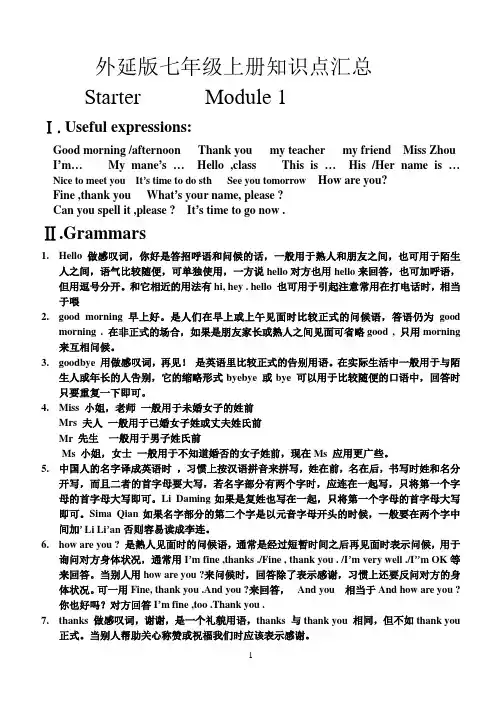
外延版七年级上册知识点汇总Starter Module 1Ⅰ.Useful expressions:Good morning /afternoon Thank you my teacher my friend Miss Zhou I’m…My mane’s …Hello ,class This is …His /Her name is …Nice to meet you It’s time to do sth See you tomorrow How are you?Fine ,thank you What’s your name, please ?Can you spell it ,please ? It’s time to go now .Ⅱ.Grammars1.Hello 做感叹词,你好是答招呼语和问候的话,一般用于熟人和朋友之间,也可用于陌生人之间,语气比较随便,可单独使用,一方说hello对方也用hello来回答,也可加呼语,但用逗号分开。
和它相近的用法有hi, hey . hello 也可用于引起注意常用在打电话时,相当于喂2.good morning 早上好。
是人们在早上或上午见面时比较正式的问候语,答语仍为goodmorning . 在非正式的场合,如果是朋友家长或熟人之间见面可省略good , 只用morning 来互相问候。
3.goodbye 用做感叹词,再见!是英语里比较正式的告别用语。
在实际生活中一般用于与陌生人或年长的人告别,它的缩略形式byebye 或bye 可以用于比较随便的口语中,回答时只要重复一下即可。
4.Miss 小姐,老师一般用于未婚女子的姓前Mrs 夫人一般用于已婚女子姓或丈夫姓氏前Mr 先生一般用于男子姓氏前Ms 小姐,女士一般用于不知道婚否的女子姓前,现在Ms 应用更广些。
5.中国人的名字译成英语时,习惯上按汉语拼音来拼写,姓在前,名在后,书写时姓和名分开写,而且二者的首字母要大写,若名字部分有两个字时,应连在一起写,只将第一个字母的首字母大写即可。
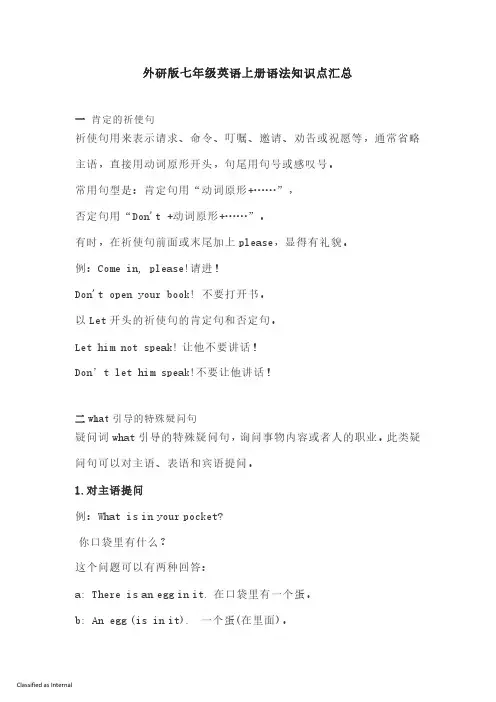
外研版七年级英语上册语法知识点汇总一肯定的祈使句祈使句用来表示请求、命令、叮嘱、邀请、劝告或祝愿等,通常省略主语,直接用动词原形开头,句尾用句号或感叹号。
常用句型是:肯定句用“动词原形+……”,否定句用“Don't +动词原形+……”。
有时,在祈使句前面或末尾加上please,显得有礼貌。
例:Come in, please!请进!Don't open your book! 不要打开书。
以Let开头的祈使句的肯定句和否定句。
Let him not speak!让他不要讲话!Don’t let him speak!不要让他讲话!二w hat引导的特殊疑问句疑问词what引导的特殊疑问句,询问事物内容或者人的职业。
此类疑问句可以对主语、表语和宾语提问。
1.对主语提问例:What is in your pocket?你口袋里有什么?这个问题可以有两种回答:a: There is an egg in it.在口袋里有一个蛋。
b: An egg(is in it). 一个蛋(在里面)。
-What are there in the room?屋子里有什么?-There are a lot of chairs in it. 里面有许多椅子。
注意:回答此句型的问题时,答句的单复数根据实际情况而定。
2.对宾语提问例:-What did you buy?-你买了什么?-I bought a bike.-我买了辆自行车。
3.对表语提问例:-What is this?-这是什么?-It's a bench. -这是一条长凳。
-What is your mother? -你妈妈是干什么的?-She is a teacher. 她是一名老师。
注意:What is+人? 此句型询问人的职业。
还可用What is sb's job?或者What does/do sb. do? 询问人的职业。
三情态动词can表请求情态动词can表请求can除了表示“能够(强调能力)”的含义,还可以表示“能否”的含义。

七年级上Revision of Starter 一、重点短语sit down坐下stand up站起来how old多大after school/class放学后/下课后listen to music听音乐welcome to+地点欢迎来某地in English用英语say that again再说一遍of course当然what color什么颜色eve,yday life每天的生活good idea好主意how many/how much多少thank you/thanks谢谢put up sb's hand举起某人的手telephone number电话号码write it on the blackboard把它写在黑板上play basketball/football打篮球/踢足球in Class Five Grade One在一年级五班see you tomorrow明天见go swimming去游泳m+国家/城市等在国家/城市等at+车站/学校/家等在车站/学校/家等sb's favorite sport/color某人最喜欢的运动/颜色good morning/afternoon/evening早上好/下午好/晚上好二、重点句型l---\邓at's your name, please? 请问你叫什么名字?---I'm/My mane's... 我叫.2.---How are you ? 你好吗?---F ine,thanks.很好,谢谢……..in spring/summer/autumn/winter在春/夏/秋/冬等3.---This is my friend/teacher, and his/her name is/he is...这是我的朋友/老师,他的名字是.4.---I t's time to go now. Goodbye.现在该走了,再见。

七年级上册英语外研社版知识点总结一、Unit 1 My new school1. 介绍自己的新学校及周围环境在这个单元中,我们学习了如何用英语介绍自己的新学校以及周围的环境。
我们学会了使用形容词和介词来描绘学校的外观和位置,为我们日常交流提供了基础词汇和句型。
2. 学习新的动词短语和日常用语在这个单元中,我们还学习了一些新的动词短语和日常用语,这些短语和用语可以帮助我们更流利地表达自己的想法和感受,使我们在英语交流中更加自信。
3. 表达自己的学校生活和喜好除了学校的介绍,我们还学会了表达自己的学校生活和喜好,这些内容涉及到动词的时态和一些常用的名词短语,帮助我们更好地展示自己的日常生活。
二、Unit 2 This is my sister1. 描述家庭成员和亲戚关系在这个单元中,我们学习了如何用英语描述家庭成员和亲戚关系,包括使用人称代词和家庭成员的称呼,让我们能够更好地向别人介绍自己的家庭。
2. 表达自己的爱好和特长我们还学习了如何用英语表达自己的爱好和特长,这些内容涉及到一些常见的动词和名词,为我们展示自己的个性提供了更多的表达方式。
3. 学习新的动词和形容词在这个单元中,我们也学习了一些新的动词和形容词,这些词汇可以帮助我们更准确地描述自己和家人,让我们的表达更加生动和有趣。
三、Unit 3 Is this your pencil?1. 学习和巩固物品的名称在这个单元中,我们学习了一些日常用品的英文名称,包括文具、衣物等,这些词汇是我们日常生活中必不可少的,掌握了这些词汇可以让我们在购物和交流中更加得心应手。
2. 学习特殊疑问句除了学习物品的名称,我们还学习了如何用特殊疑问句来询问别人是否拥有某样物品,这也为我们以后的交流提供了更多的句型结构。
3. 学习并掌握新的介词和代词在这个单元中,我们还学习了一些新的介词和代词,这些词汇的掌握可以让我们更准确地描述物品的位置和归属,提高我们的口语表达能力。
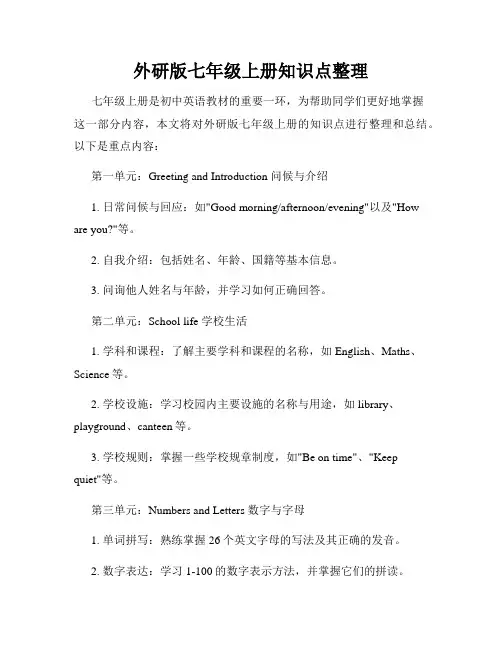
外研版七年级上册知识点整理七年级上册是初中英语教材的重要一环,为帮助同学们更好地掌握这一部分内容,本文将对外研版七年级上册的知识点进行整理和总结。
以下是重点内容:第一单元:Greeting and Introduction 问候与介绍1. 日常问候与回应:如"Good morning/afternoon/evening"以及"How are you?"等。
2. 自我介绍:包括姓名、年龄、国籍等基本信息。
3. 问询他人姓名与年龄,并学习如何正确回答。
第二单元:School life 学校生活1. 学科和课程:了解主要学科和课程的名称,如English、Maths、Science等。
2. 学校设施:学习校园内主要设施的名称与用途,如library、playground、canteen等。
3. 学校规则:掌握一些学校规章制度,如"Be on time"、"Keep quiet"等。
第三单元:Numbers and Letters 数字与字母1. 单词拼写:熟练掌握26个英文字母的写法及其正确的发音。
2. 数字表达:学习1-100的数字表示方法,并掌握它们的拼读。
3. 电话号码:了解电话号码的常用表达方式,并学会通过电话号码进行交流。
第四单元:Colors and Hobbies 颜色与爱好1. 颜色的表达:熟悉基本颜色的英文表达,如red、blue、yellow等。
2. 爱好的介绍:学习如何表达个人爱好及其相关动词,如play、sing等。
3. 日常活动:掌握日常活动的表达方式,如swimming、drawing等。
第五单元:Family and Friends 家人与朋友1. 家庭成员:了解不同的亲属称谓,如father、mother、brother等。
2. 家庭关系:学会表达个人和他人的家庭关系,如"My sister is Lucy"等。
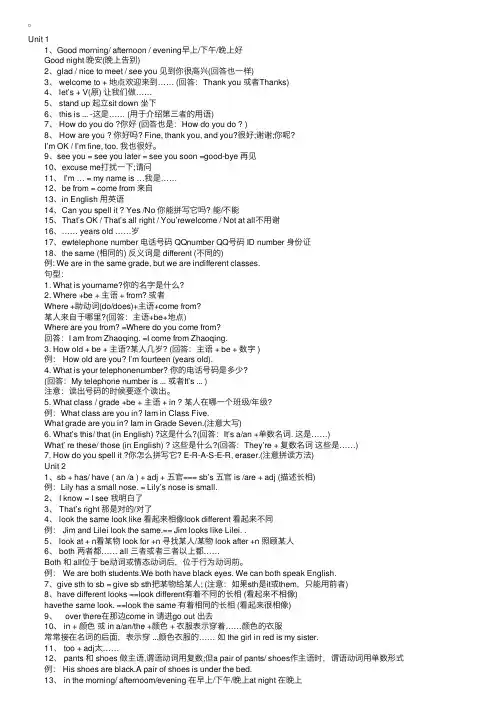
Unit 1 1、Good morning/ afternoon / evening早上/下午/晚上好 Good night 晚安(晚上告别) 2、glad / nice to meet / see you 见到你很⾼兴(回答也⼀样) 3、 welcome to + 地点欢迎来到…… (回答:Thank you 或者Thanks) 4、 let’s + V(原) 让我们做…… 5、 stand up 起⽴sit down 坐下 6、 this is ... -这是…… (⽤于介绍第三者的⽤语) 7、 How do you do ?你好 (回答也是:How do you do ? ) 8、 How are you ? 你好吗? Fine, thank you, and you?很好;谢谢;你呢? I’m OK / I’m fine, too. 我也很好。
9、see you = see you later = see you soon =good-bye 再见 10、excuse me打扰⼀下;请问 11、 I’m … = my name is …我是…… 12、be from = come from 来⾃ 13、in English ⽤英语 14、Can you spell it ? Yes /No 你能拼写它吗? 能/不能 15、That’s OK / That’s all right / You’rewelcome / Not at all不⽤谢 16、…… years old ……岁 17、ewtelephone number 电话号码 QQnumber QQ号码 ID number ⾝份证 18、the same (相同的) 反义词是 different (不同的) 例: We are in the same grade, but we are indifferent classes. 句型: 1. What is yourname?你的名字是什么? 2. Where +be + 主语 + from? 或者 Where +助动词(do/does)+主语+come from? 某⼈来⾃于哪⾥?(回答:主语+be+地点) Where are you from? =Where do you come from? 回答:I am from Zhaoqing. =I come from Zhaoqing. 3. How old + be + 主语?某⼈⼏岁? (回答:主语 + be + 数字 ) 例: How old are you? I’m fourteen (years old). 4. What is your telephonenumber? 你的电话号码是多少? (回答:My telephone number is ... 或者It’s ... ) 注意:读出号码的时候要逐个读出。
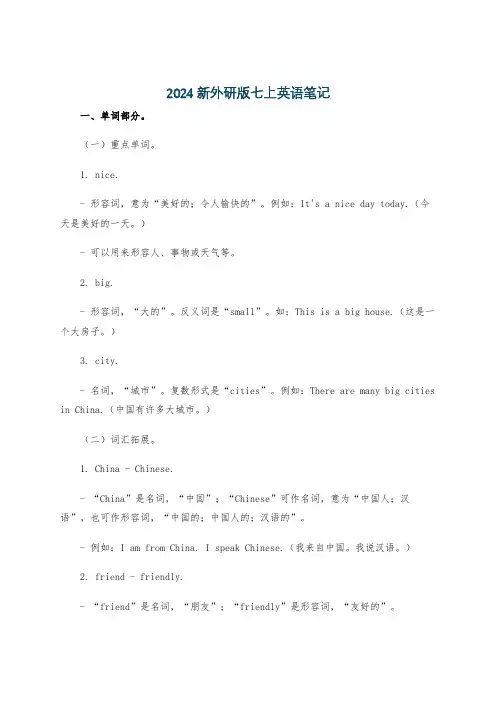
2024新外研版七上英语笔记一、单词部分。
(一)重点单词。
1. nice.- 形容词,意为“美好的;令人愉快的”。
例如:It's a nice day today.(今天是美好的一天。
)- 可以用来形容人、事物或天气等。
2. big.- 形容词,“大的”。
反义词是“small”。
如:This is a big house.(这是一个大房子。
)3. city.- 名词,“城市”。
复数形式是“cities”。
例如:There are many big cities in China.(中国有许多大城市。
)(二)词汇拓展。
1. China - Chinese.- “China”是名词,“中国”;“Chinese”可作名词,意为“中国人;汉语”,也可作形容词,“中国的;中国人的;汉语的”。
- 例如:I am from China. I speak Chinese.(我来自中国。
我说汉语。
)2. friend - friendly.- “friend”是名词,“朋友”;“friendly”是形容词,“友好的”。
- 如:He is my friend. He is very friendly.(他是我的朋友。
他非常友好。
)二、短语部分。
(一)常用短语。
1. be from.- 意为“来自……”,相当于“come from”。
- 例如:I am from Beijing. = I come from Beijing.(我来自北京。
)2. a photo of.- “……的一张照片”。
- 如:This is a photo of my family.(这是我的一张家庭照片。
)三、语法部分。
(一)一般现在时。
1. 概念。
- 表示经常发生的动作或存在的状态。
- 例如:I get up at six every day.(我每天六点起床。
)2. 动词形式。
- 当主语是第三人称单数(he/she/it等)时,动词要加 -s或 -es。
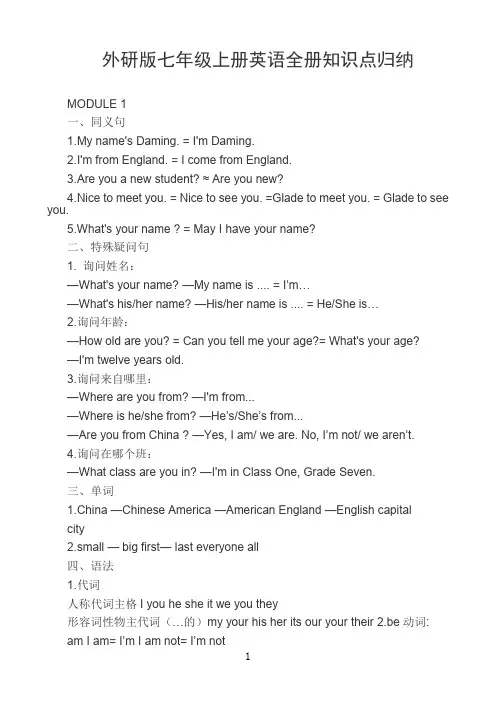
外研版七年级上册英语全册知识点归纳MODULE 1一、同义句1.My name's Daming. = I'm Daming.2.I'm from England. = I come from England.3.Are you a new student? ≈ Are you new?4.Nice to meet you. = Nice to see you. =Glade to meet you. = Glade to see you.5.What's your name ? = May I have your name?二、特殊疑问句1. 询问姓名:—What's your name? —My name is .... = I’m…—What's his/her name? —His/her name is .... = He/She is…2.询问年龄:—How old are you? = Can you tell me your age?= What's your age?—I'm twelve years old.3.询问来自哪里:—Where are you from? —I'm from...—Where is he/she from? —He’s/She’s from...—Are you from China ? —Yes, I am/ we are. No, I’m not/ we aren’t.4.询问在哪个班:—What class are you in? —I'm in Class One, Grade Seven.三、单词1.China —Chinese America —American England —English capitalcity2.small — big first— last everyone all四、语法1.代词人称代词主格I you he she it we you they形容词性物主代词(…的)my your his her its our your their 2.be动词: am I am= I’m I am not= I’m notis He /She is = He’s /She’s is not = isn’tare We /You /They are = We’re / You’re /They’re are not= aren’tMODULE 2一、单词grandparents grandfather—grandmother parents father—mothermum---dad daughter—son sister—brother aunt—uncle cousin husband---wife family woman---man women---men职业:job actor driver doctor manager nurse worker teacher policeman 工作地点:factory hospital hotel office school theatre bus station shop二、短语a photo/picture of my family in front of in/at the front of next to on the right --- on the left三、语法1.this---that these---those I---we he/she/it---they2.名词所有格:Miss Li's =her Tom’s = hisLily and Lucy's 两人共有的eg: Lily and Lucy's desk is bigLily's and Lucy's 两人各有的Lily's and Lucy's desks are small.My parents’ room is very clean.四、句子1.---Is this your sister? --- Yes, it is. No, it isn’t---Are these her books? ---Yes, th ey are. No, they aren’t.2.---Who is this? --- This is my brother.--- Who are they/these? --- They are my cousins3. ---What’s your sister’s name?---My sister’s name is…/Her name is…4.---What does your father do?=What is your father's job?=What is your father?---He is a ...MODULE 3一、单词1.buildings: classroom, dining/sports hall, library, office, science lab, playground2.something: blackboard, book , room, computer, desk, furniture, map,wall, picture,television3.numbers: thirteen fourteen fifteen sixteen seventeen eighteen nineteenthirty forty fifty sixty seventy eighty ninety4.介词:next to ≈ near behind ≠ in front of in/at the front of:在......里面的前面in on under5. in the middle of on the left of--- on the right ofbetween …and… a map of our school6.right 正确的≠wrong右边的≠left二、句子1. Where is the office building ? It is between the dining hall and the library.2. How many students are there in your class? There are 38 students in my class.三、语法(There be)----Are there any school offices?----Yes, there are. There are some offices.----Is there a computer on Miss Li's desk?----No, there isn't.注意:1.就近原则:1). There is an orange and two apples on the desk.There are two apples and an orange on the desk.2). There are some students in the classroom.Are there any students in the classroom? Yes, there are. No, there aren’t 3)There aren’t any students in the classroom.There isn’t an orange on the desk.MODULE 4一、family members:aunt uncle grandma grandmother grandpa grandfather mother father mum dad sister brother二、短语句型Thank you for your email.your help.helping me.asking me.inviting me.Make a family tree for your family.----How many people are there in your family?----There are four. There are my mum and dad, my sister and me.----Have you got an aunt?/any .....?----Yes,I have./No,I haven't.----Have you got a small family or a big family?----I've got a big family.or的用法:①或; (选择疑问句)②并列否定:I don't like swimming or dancing.MODULE 5-6一、单词1. orange 橙汁have some orange [U]橙色the oranges are orange [C]橙子This is an orange [C]2.kind 善良He is very kind.种类=tyre a kind / type of fruit two kinds /types of fruits3. gym: 不受天气影响的室内体育馆、健身房或运动馆stadium: 周围有看台的露天大型运动场4.healthy ≠ unhealthy keep/stay healthy保持健康in good health ≠ in poor/bad healthbe healthy = be in healthbe good for one’s health ≠be bad for one’s health名词变复数条件变化形式例词一般情况+ - s shops单词以s、x、ch、sh结尾+ - es buses 以辅音字母+y结尾去y为i + -es city-cities 单词以“o”结尾有生命+ - es tomatoes无生命+ - s zoos一些以‘f’或‘fe’结尾的单词把’f‘或’fe‘变成’ves'knife-knives二、短语三、句型四、区别MODULE 7一、短语talk about sth.谈论某事talk to sb. 跟某人谈话(一方讲一方听)talk with sb. 跟某人谈话(双方都讲)get up≠go to bedgo home≠leave home(for)study science/history/chemistry/maths/...二、语法①时间表达法:What's the time? =What time it is?顺读法:It's two ten. 2:10 (直接读出数字)逆读法:①It's ten past two.(2:10) ≤30'②It's ten to ten. (2:50) >30'整点表达法:It's two o'clock. (2:00) 注意:(不用介词)②一般现在时(1)【No. 1】一般现在时的功能1.表示事物或人物的特征、状态。
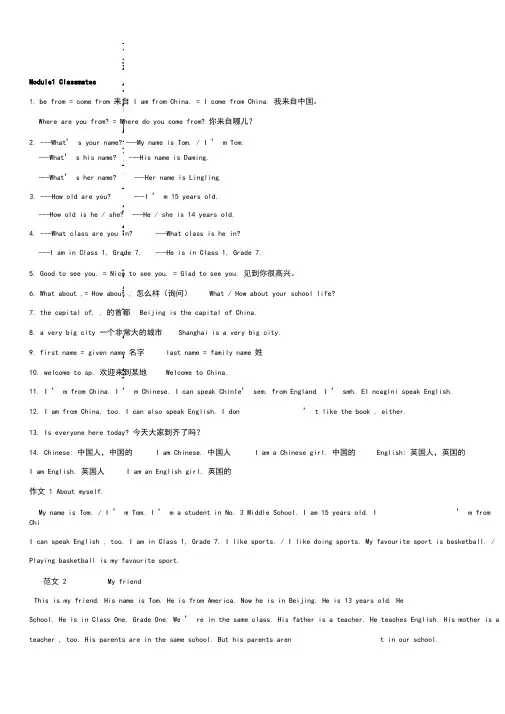
Module1 Classmates1. be from = come from 来自 I am from China. = I come from China. 我来自中国。
Where are you from? = Where do you come from? 你来自哪儿?2. ---What ’ s your name? ---My name is Tom. / I ’ m Tom.---How old is he / she? ---He / she is 14 years old. 4. ---What class are you in?---What class is he in? ---I am in Class 1, Grade 7. ---He is in Class 1, Grade 7.5. Good to see you. = Nice to see you. = Glad to see you. 见到你很高兴。
6. What about ,= How about , 怎么样(询问) What / How about your school life?7. the capital of, , 的首都 Beijing is the capital of China.8. a very big city 一个非常大的城市 Shanghai is a very big city.9. first name = given name 名字 last name = family name 姓 10. welcome to sp. 欢迎来到某地 Welcome to China.11. I ’ m from China. I ’ m Chinese. I can speak ChinIe ’ sem. from England. I ’ smh. EI ncaglni speak English. 12. I am from China, too. I can also speak English. I don ’ t like the book , either.13. Is everyone here today? 今天大家到齐了吗? 14. Chinese: 中国人,中国的 I am Chinese. 中国人I am a Chinese girl. 中国的English: 英国人,英国的I am English. 英国人I am an English girl. 英国的作文 1 About myself.My name is Tom. / I ’ m Tom. I ’ m a student in No. 3 Middle School. I am 15 years old. I ’ m fromChiI can speak English , too. I am in Class 1, Grade 7. I like sports. / I like doing sports. My favourite sport is basketball. / Playing basketball is my favourite sport.范文 2 My friendThis is my friend. His name is Tom. He is from America. Now he is in Beijing. He is 13 years old. HeSchool. He is in Class One, Grade One. We ’ re in the same class. His father is a teacher. He teaches English. His mother is a teacher , too. His parents are in the same school. But his parents aren最新外研版英语七年级上册知识点总结 ---What ’ s his name? ---His name is Daming. ---What ’ s her name?---Her name is Lingling. 3. ---How old are you? ---I ’ m 15 years old. t in our school.Module2 My family Vocabulary:A family: father - mother dad (daddy) — mum ( mom) / mummy parent -parents uncle —aunt brother—sister son—daughter husband—wife man -- woman boy - girl grandfather - - grandmother grandpa 丁grandma grandparent -grandparents cousinB job: a driver, a farmer, a worker, a manager, a teacher, a student, a doctor, a nurse, a singer, a writer, an actor, an actress, a policeman, policewoman,C place: at a bus station, in a hospital, in a hotel, at a theatre, on a farm, at school, in the shop, in a factory1.I have an elder brother. 哥哥She has a younger / little sister. 妹妹2.This is a photo of my family. 一张我的全家福My family is a big one. 家庭This is Jim ' s family tree谱My family are watching TV now. 家人3.on the left在左边on the right在右边on the left / right of 在…的左边/右边4.next to 在•・旁边,紧挨着=beside = near5.in front of 在…前面 (相对独立) in the front of 在“前部(在…内部) There is a tree in front of the house. There is ablackboard in the front of the classroom.6.at the bus station 在公共汽车站at school 在学校at the same hospital 在同一所医院at a police station 在警局7.(be) in hospital (生病)住院in the hospital 在医院Tom is ill in hospital because he is ill. Tom’ s father works in the hospital.8.in the photo 照片上There is a big house in the photo.9.a manager of a theater = a theater manager 一个剧院经理10.a manager of a hotel = a hotel manager 一个旅馆经理11.a bus driver 一位公共汽车司机 a farm worker 一位农场工人 a shop worker 一名店员an English teacher 一位英语老师12.man - woman (men - women) a woman doctor - women doctors 女医生 a man teacher — men teachers 男老There are three men teachers in the office.13.Is this / that your family? f Yes, it is./ No, it isn ' t.Are these / those your parents? f Yes, they are. / No, they aren ' t.14.Who is this? Who is this boy?Who are the boy and the girl? They are my friends.15.问职业:What is your mother? = What does your mother do? = What is your mother What be + sjob?(主语)? Whatdo / does + 主语+do? What be one ’ s job?16.介绍家庭常用的句型。
外研版七年级上英语第一单元知识点一、重点单词。
1. meet (v.)- 意为“遇见;结识”。
例如:Nice to meet you.(很高兴见到你。
)- 其过去式和过去分词都是met。
2. first (adj.)- 意为“第一的;首要的”。
例如:He is the first student to come to school.(他是第一个来学校的学生。
)- 也可作副词,意为“首先;第一”,例如:First, let's read the text.(让我们读课文。
)3. English (n. & adj.)- 作名词时,意为“英语”,例如:I like English very much.(我非常喜欢英语。
)- 作形容词时,意为“英国(人)的”,例如:He is an English boy.(他是一个英国男孩。
)4. class (n.)- 意为“班级;课”。
例如:I'm in Class 3.(我在三班。
)We have an English class today.(我们今天有一节英语课。
)5. student (n.)- 意为“学生”。
例如:There are fifty students in our class.(我们班有五十个学生。
)6. Miss (n.)- 意为“小姐;女士(对未婚女性的称呼)”。
例如:Miss Li is our English teacher.(李小姐是我们的英语老师。
)7. twelve (num.)- 意为“十二”。
例如:There are twelve months in a year.(一年有十二个月。
)8. year (n.)- 意为“年”。
例如:I'm thirteen years old.(我十三岁了。
)9. thirteen (num.)- 意为“十三”。
例如:He is thirteen years old this year.(他今年十三岁了。
外研版七年级上册必背知识点梳理七上各模块必背知识点n.名词v.动词adj.形容词adv. 副词Module 1—Module4(预备部分)Be动词:肯定形式:am,is,are否定形式:am not,is not(isn’t),are not(aren’t)1.What's your name? 你叫什么名字?—My name's Daming./ I'm Daming. 我的名字是大明/我是大明。
2.Can you spell it, please? 你能拼写一下吗?3.How are you? 你好吗?—Fine,thank you, and how about you?(And you?) 我很好,你呢?(Thank you = Thanks)4.介绍别人要说: This is ….. 这是…..5. It's time to do sth. = It’s time for sth. 该做某事了。
6. See you tomorrow.明天见。
7. 元音因素前用冠词:an 辅音因素前要用:a例如:an apple a pen8. Sit down. 坐下来Stand up. 站起来Put up your hand. 举起你的手Open your book. 打开你的书Close your book. 合上你的书Listen to music. 听音乐9. What class are you in? 你在几班?I am in Class Three Grade Seven. 我在七年级三班。
10. What's your telephone number? 你的电话号码是什么?11. How old are you? 你多大了?—I am twelve (years old). 我12岁。
How old are Tim and Tom? 他们多大了?—They are thirteen (years old). 他们十三岁了。
外研版初中七年级上册一、语法。
1. 一般现在时。
- 用法:表示经常或习惯性的动作或状态;表示客观事实或普遍真理。
- 结构:- 肯定句:主语+动词原形(第三人称单数形式+s/es)+其他。
例如:I like apples. He likes bananas.- 否定句:主语+don't/doesn't+动词原形+其他。
例如:I don't like meat. She doesn't like fish.- 一般疑问句:Do/Does+主语+动词原形+其他? 例如:Do you play football? Does he go to school by bike?2. 名词复数。
- 一般情况加 -s,如book - books。
- 以s, x, ch, sh结尾的加 -es,如box - boxes。
- 以辅音字母 + y结尾的,变y为i加 -es,如baby - babies。
- 以o结尾的,有生命的加 -es(如tomato - tomatoes),无生命的加 -s(如photo - photos)。
- 以f或fe结尾的,变f或fe为v加 -es,如knife - knives。
3. 形容词性物主代词。
- 包括my(我的)、your(你的/你们的)、his(他的)、her(她的)、its (它的)、our(我们的)、their(他们的)。
- 用法:后面必须接名词,用来表示所属关系。
例如:This is my book.二、词汇。
1. 家庭成员相关。
- father(父亲)、mother(母亲)、parent(父母)、grandfather(祖父/外祖父)、grandmother(祖母/外祖母)、grandparent(祖父母/外祖父母)、brother (兄弟)、sister(姐妹)、son(儿子)、daughter(女儿)。
2. 学校相关。
- school(学校)、classroom(教室)、teacher(教师)、student(学生)、desk(书桌)、chair(椅子)、book(书)、pencil(铅笔)、pen(钢笔)。
外研版七年级语文上册详细知识点汇总
第一单元:写人课
1. 描述人物外貌特征
- 使用形容词和形容词短语来描述人物的身高、体型、脸型、
发型、眼睛等外貌特征。
- 使用颜色词来描述人物的眼睛、皮肤等颜色。
2. 描述人物性格特点
- 使用形容词和形容词短语来描述人物的性格特点,例如慈祥、善良、勇敢等。
- 使用具体的行为和事例来展示人物的性格特点。
3. 描述人物经历和成就
- 使用过去时态和描述性的文字来叙述人物的经历和成就。
- 使用时间词和事件连接词来串联人物的经历和成就。
4. 描述人物与自然的关系
- 使用形容词和形容词短语来描述人物与自然的关系,例如热爱大自然、喜欢观察植物等。
- 使用具体的场景和事例来展示人物与自然的关系。
第二单元:走进课堂
1. 研究方法
- 使用适当的研究方法来提高研究效果,例如做笔记、加深理解、多做练等。
- 注意研究环境和研究态度的影响,创造良好的研究氛围。
2. 学业规划
- 设定长期目标和短期目标,合理规划学业时间和任务。
- 发展良好的研究惯和自我管理能力。
3. 合作研究
- 学会团队合作和分工合作的重要性。
- 与同学共同解决问题和完成任务。
4. 课堂礼仪
- 遵守课堂纪律和规则,尊重师长和同学。
- 保持良好的听讲态度和注意力集中。
以上是外研版七年级语文上册的一些详细知识点,希望对你有帮助!。
⼀、48个国际⾳标及26个英⽂字母的正确书写 要熟练掌握元⾳和辅⾳,5个元⾳字母(a, e, i, o, u),字母的正确占格及单词间距。
⼆、be动词的⽤法 be动词有三种变形,分别是:am, is, are。
记忆⼝诀: "我"⽤am, "你"⽤are, is⽤于"他、她、它";单数全都⽤is,复数全部都⽤are。
三、⼈称及⼈称代词的不同形式(主格和宾格) 1、三种⼈称:第⼀⼈称(I, we),第⼆⼈称(you, you),第三⼈称(he, she, it, Maria)。
2、⼈称代词的主格,即⼈称代词位于句⼦主语位置时的形态:I, We, You, You, He, She, It, Maria。
3、⼈称代词的宾格,即⼈称代词位于句⼦宾语位置时的形态:me, us, you, you, him, her, it。
4、形容词性物主代词:my, our, your, your, his, her, its, their。
5、名词性物主代词:mine, ours, yours, yours, his, hers, its, theirs。
6、反⾝代词:myself, ourselves, yourself, yourselves, himself, herself, itself, themselves。
四、基数词(表⽰数量多少的词,⼤致相当于代数⾥的⾃然数) zero, one, two, three, four, five, six, seven, eight, nine, ten, eleven, twelve, thirteen, fourteen, fifteen, sixteen, seventeen, eighteen, nineteen, twenty, twenty-one, twenty-two, twenty-three,twenty-four, twenty-five, twenty-six, twenty-seven, twenty-eight, twenty-nine, thirty, forty, fifty, sixty,seventy, eighty, ninety, one hundred,one hundred and one。
外研版初一上册英语重点知识
1.人称及人称代词的不同形式:学生需要掌握主格和宾格的人称
代词,例如I/me, you/you, he/him等。
2.基数词:这是表示数量的词,相当于代数里的自然数,例如zero,
one, two等。
3.一般疑问句及特殊疑问句:学生需要学会如何构造和回答这两
种类型的疑问句。
4.可数名词变复数:英语中的名词有单数和复数形式,学生需要
掌握可数名词如何变为复数形式,特别是以o结尾的词,有的加“-s”,有的加“-es”。
5.常用单词和短语:学生需要熟悉一些常用的单词和短语,以便
能够理解和使用英语进行日常交流。
6.基本语法:包括句子的结构、时态、语态等基本的语法知识。
7.阅读和写作技能:通过阅读和写作练习,提高学生的英语阅读
和写作能力。
8.听力和口语技能:通过听力和口语练习,提高学生的英语听力
和口语能力。
外研版七年级上册知识点整理Module 1重点短语1.be from... =come from... 来自......2....years old ......岁3.what about... =how about... ......怎么样?4.in Class Ten Grade Seven 在七年级十班5.the capital of... ...... 的首都/省会6.first name =given name 名st name=family name 姓8.English name 英文名字9.Chinese name 中文名字重点句子1.I’m Chinese ,and I’m from China. 我是中国人, 我来自中国(I’m Chinese, and I come from China.)2. Where are they from? 他们来自哪里?(=Where do they come from?)They are from America. 他们来自美国.(=They come from America.)3.How old is that man? 那位男子多少岁了?He is forty-four. 他44岁4. The students are in Class Five Grade Seven.这些学生在七年级五班5. Tom is in Class One with Lingling. 汤姆和玲玲在一班。
=Tom with Lingling is in Class One.=Tom and Lingling are in Class One.6.What about you?=How about you?=And you? 你呢?/你怎么样?7.Welcome to Class 6 Grade 7 ! 欢迎到七年级六班。
8. Beijing is the capital of China. 北京是中国的首都。
9.Good to see you.=Nice to see you.=Glad to see you. 很高兴见到你。
10.I’m Tony Smith.Tony is my first name and Smith is my last name. 我是Tony Smith,Tony是我的名,Smith是我的姓。
Module2重点短语1.a photo of Tony’s family 一张Tony 的家庭的照片2.on the left of…在......的左边3.next to... 紧挨着.....; 紧靠......4.in front of... 在......前面(外面)in the front of... 在......前部(内部)5.Tony’s parents Tony的父母6.in the photo 照片上, 在照片中7.at the bus station 在公共车站8.at a police station 在警察局9.a manager of a theater 一位剧院负责人a manager of a hotel 一位宾馆经理10.in the same hospital 在同一家医院11.a bus driver 一位公共汽车司机a farm worker 一位农场工人a shop worker 一名店员an English teacher 一位英语教师12. a man/woman driver 一位男/女司机复数:men/women drivers重点句子1.This is a photo of Tony’s family. 这是Tony的一张全家福。
2.What a big family! 多大的一个家庭啊!3.My mum’s parents are on the right. 我母亲的父母在右边4.The woman next to me is my dad’s sister.紧挨着我的这位女子是我父亲的妹妹。
5.Is this your family ? 这是你的家庭吗?6.Are these your grandparents ? 这(些)是你的祖父母吗?7.My mother is the manager of a theater. 我的母亲是剧院负责人。
8.My father’s job is at a police station. 我父亲在警察局工作。
9.His parents are shop workers. 他的父母是商店工作人员。
Module 3重点短语1.a lot of furniture 大量的教学设施;大量的家具2.on everyone’s desk 在每个人的课桌上on the teacher’s desk 在讲桌上3.on the wall 在墙上4.in the front of...... 在.....前面(内部)in front of...... 在......前面(外部)5.a map of the world 一张世界地图a map of China 一张中国地图6.in the dining hall 在饭厅里7.at the school gate 在校门口8.on/in the playground 在操场上9.a science lab 一个科学实验室10.a sports hall 一个体育馆11.an office building 一幢办公楼12.a classroom building 一幢教学大楼13.in the science building 在科学楼里14.five computer rooms 五间微机室15.in the middle of...... 在......的中间16.on the left of...... 在......的左边17.between the library and the dining hall 在图书馆和食堂之间18.be for....... 用于......; 为......准备的重点句子1.What’s your classroom like? 你们的教室怎样?It’s really big. 它真的很大。
2.How many students are there in your class? 你班上有多少学生?There are forty-four students in my class. 我班上有44位学生。
3.There aren’t any computers in our classroom.在我们教室里没有电脑。
4.Are there any computers on everyone’s desk ?每位学生的课桌上有电脑吗?Yes, there are some. ( No, there aren’t any.) 是的,有(不,没有。
)5.What’s in your classroom? 你们的教室里有什么?There is a lot of furniture. 有大量的教学设备。
6.There is a map and some pictures on the walls.墙上有一张地图和一些画。
=There are some pictures and a map on the walls.7.Gao Yan’s between Zhao feng and Li Min.高燕在赵峰和李民中间。
8.In the middle of the school is a big playground.一个大操场在学校中间。
=A big playground is in the middle of the school.9.Where is the library? 图书馆在哪里?It’s next to the science lab. 它在科学楼的旁边。
Module 4重点短语1. have/has got... (某人)有......2.healthy food and drink 健康的饮品和饮料unhealthy food and drink 不健康的饮品和饮料3. go shopping for sth. 去买......4.too much +不可数; too many+可数复数太多.......5. be good for... 对......有好处6. be bad for…对......有害处7.lots of...= a lot of...=many+可数复数大量的......;许多......lots of...= a lot of...=much+不可数8.get sth. for sb=buy sth. for sb. 为某人买......9.what kind of... 什么种类的......10.one’s favourite food and drink 某人最喜欢的食品饮料11.chicken soup 鸡汤12.stay healthy 保持健康13.eat well 吃好14.have a good breakfast 吃一顿营养早餐15.have sth. for breakfast 在早餐吃......16.remember to do sth. 记得做......17.a bit tired 有一点儿累重点句子1.We’ve got lots of apples. 我们有大量的苹果。
2.He hasn’t got any meat. 他没有一些肉。
3.Have you got any chocolate? 你们有一些巧克力吗?Yes, we have. / No, we haven’t. 是的,我们有。
/不,我们没有。
4.Let’s go shopping for food and drink.让我们去买一些食品饮料吧。
5.Let’s get some coffee for your mum.让我们给你妈妈买点咖啡吧。
6.Too much chocolate isn’t good for you. 太多的巧克力对你不好。
7.What kind of fruit ? 什么种类的水果?8.Cola is bad for you. 可乐对你有害。
9.How about some orange juice? 一些橘汁怎么样?Good idea. 好主意。
10.Is your food and drink healthy? 你的饮食健康吗?11.It is important to stay healthy. 保持健康很重要。